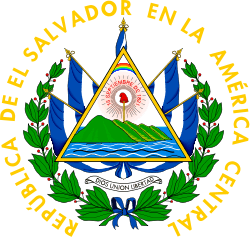Salvadoran presidential election, 2009
| | |||||||||||||||||||||||||||||
| |||||||||||||||||||||||||||||
| |||||||||||||||||||||||||||||
| |||||||||||||||||||||||||||||
 |
| This article is part of a series on the politics and government of El Salvador |
A presidential election was held in El Salvador on 15 March 2009. The main candidates were Rodrigo Ávila (ARENA) and Mauricio Funes (FMLN). Funes won the election with 51.3% of the vote.
Polls
A poll from mid September 2008 gave Funes 29.2% and Ávila 26.1%, while Tomás Chévez (PCN) got 1.9%. However, a poll from late September gave Funes 47.4% to 23.8% for Ávila. This latter poll showing Funes with a large lead is more consistent with polling from previous months.[1][2]
Later polls from 2008 showed a tightening race between Funes and Ávila, with Funes retaining the lead.[3]
Candidates
| Abbreviation | Party | Presidential nominee | Running mate | |
|---|---|---|---|---|
| FMLN | Farabundo Martí National Liberation Front | Mauricio Funes | Salvador Sánchez Cerén | |
| ARENA | Nationalist Republican Alliance | Rodrigo Ávila | Arturo Zablah | |
The Christian Democratic Party had nominated Carlos Rivas Zamora and Merlin Peña, but withdrew the nominations on 2 February 2009 after it became apparent that they would have little chance of winning the election. The PDC did not immediately voice support for one of the other candidates.[4] In the same direction, the PCN, which had nominated Luis Tomás Chévez, also withdrew its candidate a couple days later.
Results
FMLN won the election with 51.3% of the vote, while ARENA received 48.7%, marking the first time ARENA had lost a presidential election in 20 years.[5] Of the election, Funes said, "This is the happiest night of my life, and I want it to be the night of El Salvador's greatest hope. I want to thank all the people who voted for me and chose that path of hope and change."[6] Ávila conceded defeat, saying that he and his party "will be a constructive opposition."[6] An observation team from the Organization of American States said that the elections were held without any major incidents, although there were claims of Hondurans voting at a voting center in Torola, Morazán.[7]
Several governments said that they looked forward to working with the new government, including Taiwan and the United States.[8][9]
| Candidate – Party | Votes | % |
|---|---|---|
| Mauricio Funes – Farabundo Martí National Liberation Front (Frente Farabundo Martí para la Liberación Nacional) | 1,354,000 | 51.32 |
| Rodrigo Ávila – Nationalist Republican Alliance (Alianza Republicana Nacionalista) | 1,284,588 | 48.68 |
| Total | 2,638,588 | 100.00 |
| Invalid votes | 20,550 | |
| Total votes (turnout 61.9%) | 2,659,138 | |
| Registered voters | 4,294,849 | |
| Source: TSE 1, TSE 2 | ||
References
| Wikinews has related news: El Salvador elects leftist president Funes |
- ↑ "Leftist Funes Loses Steam in El Salvador". Angus Reid Global Monitor. 13 September 2008. Retrieved 11 March 2009.
- ↑ "Leftist Funes Leads Ávila in El Salvador". Angus Reid Global Monitor. 29 September 2008. Retrieved 11 March 2009.
- ↑ "Close Presidential Race Continues in El Salvador". Angus Reid Global Monitor. 1 December 2008. Retrieved 11 March 2009.
- ↑ "Christian Dems Quit Salvador Election Race". Prensa Latina. 3 February 2009. Retrieved 11 March 2009.
- ↑ "Left-winger wins El Salvador poll". BBC. 2009-03-16. Retrieved 2009-03-17.
- 1 2 Booth, William (2009-03-16). "Leftist Declares Victory In El Salvador Election". Washington Post. Retrieved 2009-03-17.
- ↑ "OAS recognizes El Salvador's election orderly held". Xinhua. 2009-03-16. Retrieved 2009-03-17.
- ↑ "Taiwan to strengthen ties with El Salvador's next president". M&C. 2009-03-16. Retrieved 2009-03-17.
- ↑ "US congratulates leftist winner in El Salvador". AFP. 2009-03-16. Retrieved 2009-03-17.
.jpg)